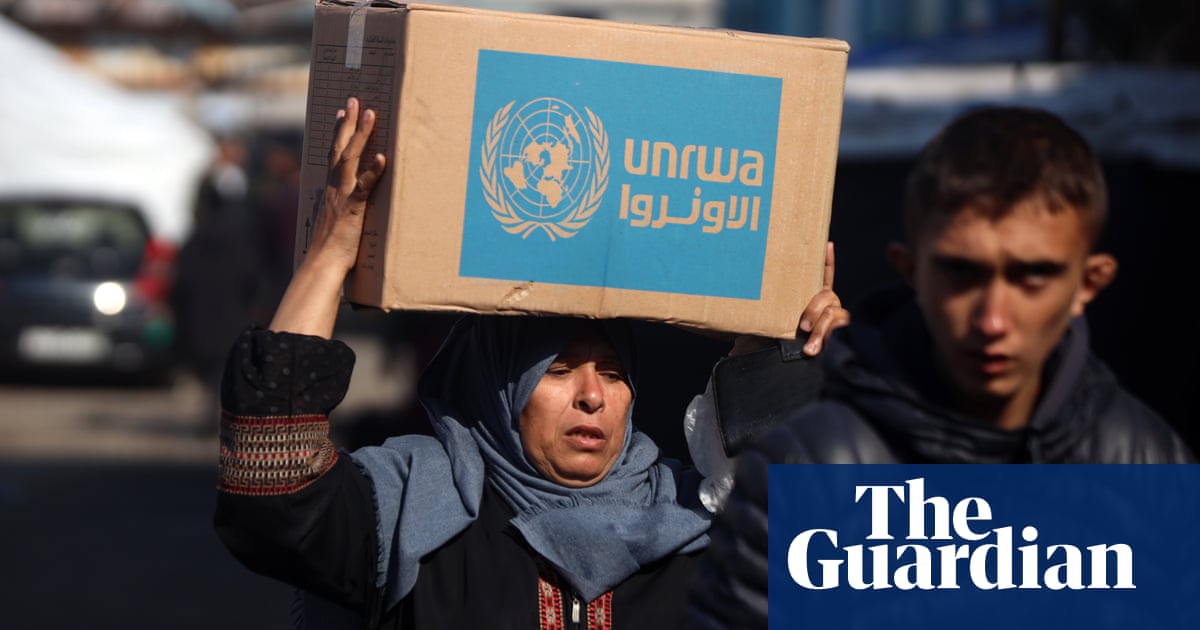The embattled UN agency for Palestinian refugees, Unrwa, has accusedIsraelof abusing dozens of its staff in military detention and using some as human shields.
The head of the agency, Philippe Lazzarini, said that more than 50 staff members, including teachers, doctors and social workers, had been detained and abused since the start of the 18 month-long war inGaza.
“They have been treated in the most shocking & inhumane way. They reported being beaten + used as human shields,” Lazzariniwrote on X.
Those detained had been subjected to “sleep deprivation, humiliation, threats of harm to them & their families + attacks by dogs … [and] forced confessions”.
UN officials said the reported abuse had taken place in Gaza and also in military detention sites in Israel.
The Israeli military has not responded directly to Lazzarini’s accusation, but has previously denied allegations of widespread abuse in its detention facilities and by its troops.
It has, however, launchedinvestigationsinto abuse by individual soldiers during the war, and into the use of detainees as human shields,bringing chargesagainst service personnel in some cases.
The Palestine Red Crescent Society (PRCS), said on Tuesday that Israel had released a medic held since a deadly and hugely controversial attack by Israeli troops on ambulances in southern Gaza on 23 March.
Eight PRCS staff members, six from the Gaza civil defence agency and one Unrwa employee, were killed in the attack, according to the UN humanitarian office OCHA.
The killings sparked international condemnation, including concern from the UN high commissioner for human rights, Volker Türk, about possible war crimes.
Relations between Israel and Unrwa have plunged since the beginning of the war, which was triggered by a surprise attack by Hamas militants in southern Israel in October 2023 during which they killed 1,200 people, mostly civilians, and took 250 hostage.
Israel bannedall cooperationwith Unrwa’s activities in Gaza and the occupied West Bank earlier this year, and claims the agency has been infiltrated by Hamas, an allegation that has been fiercely contested.
The international court of justice, the UN’s highest court, is currently hearing statements from dozens of countries and organisations before delivering a legal opinion on Israel’s humanitarian obligations to Palestinians. A key issue is whether Israel’s ban on Unrwa’s operations in Palestine is legal.
Israel is not participating at the ICJ but has dismissed the hearings as “part of the systematic persecution and delegitimization” of the country. The foreign minister, Gideon Saar, said on Sunday that the hearings were “another attempt to politicise and abuse the legal process to persecute Israel”.
“The goal is to deprive Israel of its most basic right to defend itself,” he said. “It is not Israel that should be on trial. It is the UN and Unrwa. The UN has become a rotten, anti-Israel and antisemitic body.”
The hearings come amid an intensifying bombardment of Gaza, which had killed at least 27 Palestinians in the past 36 hours, according to local health officials on Monday. The Israeli military said airstrikes had killed three militant commanders.
Palestinian health officials in the territory say 2,151 people, including 732 children, have been killed since Israel broke a fragile ceasefire on 18 March that had been in place since mid-January.
Israel imposed a tight blockade on Gaza almost two months ago, stopping all food, fuel, medicines and other items from entering. It says the measure is intended to force Hamas into releasing hostages and accuses it of systematically stealing humanitarian assistance.
Rights groups accuse Israel of using a “starvation tactic” that endangers the whole population, potentially making it a war crime.
Humanitarian workers say supplies are running desperately low, with most people eating one meal or less a day. Major agencies such as the World Food Programme and Unrwa have distributed their last stocks of flour and other basic foodstuffs, and medics say malnutrition levels are rising.
Hamas is still holding 59 hostages, 24 of whom are believed to be alive, after most of the rest were released in ceasefire agreements and other deals.
Families of deceased hostages called on Tuesday for the return of their loved ones’ remains. There are fears that poor conditions and continuing fighting could lead to many being destroyed or soon becoming unidentifiable.
“After everything we went through on that day and since, it cannot be that my father’s body will also disappear from the face of the Earth,” said Bar Godard, whose parents were killed during the 2023 Hamas raid and whose father’s body was taken to Gaza.
Negotiations for a fresh ceasefire appear to have stalled, with conflicting reports about progress in ongoing talks. Few observers expect a breakthrough in the near future, though analysts say Donald Trump’s scheduled visit to Saudi Arabia, Qatar and the United Arab Emirates in May could lead to renewed US pressure on Israel that might potentially secure a deal.
Israeli forces have killed more than 52,000 Palestinians, mostly women and children, since it launched its offensive on Gaza, according to the territory’s health ministry.
Bombardments and ground operations have also destroyed vast areas and displaced about 80% of the population, many of them 10 or more times.
Israel’s prime minister, Benjamin Netanyahu, has vowed to continue the offensive until all the hostages are returned and Hamas is either destroyed or agrees to disarm and leave the territory.
